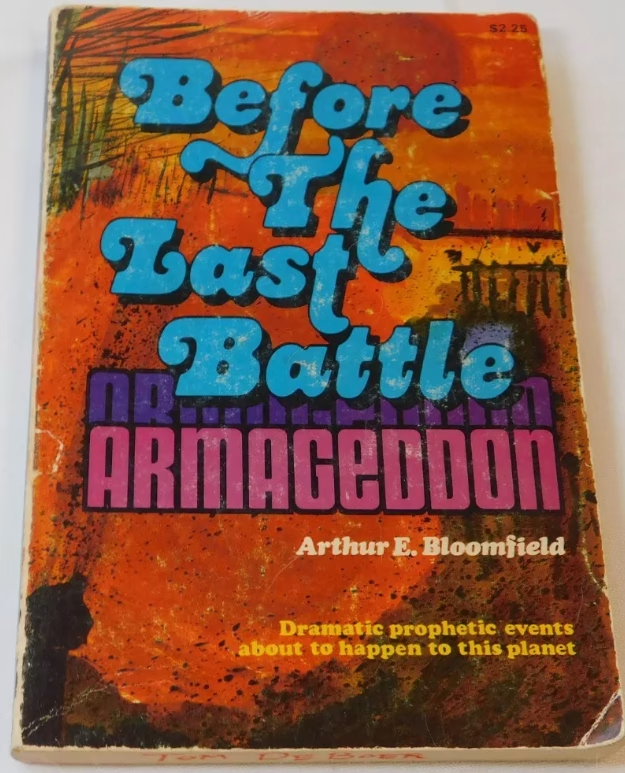I grew up in a church that was enamored with many things that I now find to be less that sound doctrinally – Finney’s sinless perfection for one. One thing that made a huge impact on my thinking was the dispensational thinking of a particular strand unique to my church. The source of much of this dispensational theology was a pastor named Arthur Bloomfield. He wrote and taught quite a bit, mainly on Daniel, Revelation, and other prophetic literature.
He has some odd hermeneutical principles that I embraced until I started looking at them a little bit closer.
Take this passage from the book of Amos for example; in it Amos is denouncing the sins of the northern kingdom of Israel and pronouncing judgment against them for their sins. Amos writes:
“Are you not as the sons of Ethiopia to Me, O sons of Israel?” declares the Lord.
Have I not brought up Israel from the land of Egypt, and the Philistines from Caphtor and the Arameans from Kir? Behold, the eyes of the Lord God are on the sinful kingdom, and I will destroy it from the face of the earth; Nevertheless, I will not totally destroy the house of Jacob,” Declares the Lord. “For behold, I am commanding, and I will shake the house of Israel among all nations as grain is shaken in a sieve, but not a kernel will fall to the ground. All the sinners of My people will die by the sword, Those who say, ’The calamity will not overtake or confront us.’
In that day I will raise up the fallen booth of David, and wall up its breaches; I will also raise up its ruins, and rebuild it as in the days of old; that they may possess the remnant of Edom and all the nations who are called by My name,” Declares the Lord who does this.
Amos 9.7-12
It is instructive to see how Pastor Bloomfield interprets this passage. In a long section on the Ark of the Covenant he has this to say:
David built a tabernacle for the Ark in Jerusalem, before it entered into its rest in the temple, while it was still the symbol of conquest. Amos says, speaking of the return of the Jews, ’In that day will I raise up the tabernacle of David that is fallen, and close up the breaches thereof; and I will raise up the ruins, and I will build it as in the days of old: that they may possess the remnant of Edom, and of all the heathen.’ –Amos 9.11-12
The Ark was kept in the tabernacle of David during the wars of David after which it was transferred to the temple of Solomon. Amos gives the reasons for building again the tabernacle of David as it was in the days of old–namely, conquest, prosperity, safety. The tabernacle of David would be quite empty without the Ark. You will note also that the building of the tabernacle of David gives promise of the same blessings as does the lifting up of the ensign.
Bloomfield also mentions this in passing in his book All Things New (p. 236): “The tabernacle of David will be rebuilt (Amos 9:11).”
So we see that Pastor Bloomfield took a woodenly literal approach and said that the tabernacle will literally be rebuilt and that this will occur after a future return of presumably unbelieving Jews, and he adds that the Ark of the Covenant will be placed in this tabernacle mentioned by Amos. It sounds straightforward enough on its face, but there is one large problem, namely that the Holy Spirit through the Apostle James has given us the correct interpretation of this passage and it is completely different from what Pastor Bloomfield wrote.
In the famous Council of Jerusalem described in Acts 15 which dealt with the Gentiles being saved and the law of Moses, the Apostle James stood up and the account reads like this:
And after they had stopped speaking, James answered, saying, “Brethren, listen to me. Simeon has related how God first concerned Himself about taking from among the Gentiles a people for His name. And with this the words of the Prophets agree, just as it is written, ’After these things I will return, and I will rebuild the tabernacle of David which has fallen, and I will rebuild its ruin, and I will restore it, In order that the rest of mankind may seek the Lord, and all the Gentiles who are called by My name,’ Says the Lord, who makes these things known from of old. Therefore it is my judgment that we do not trouble those who are turning to God from among the Gentiles. Acts 15.13-19
James, inspired by God, tells us that the passage in Amos was being fulfilled in his day by the calling of the Gentiles and their grafting into the Israel of God. It has nothing to do with a literal tabernacle being rebuilt in some distant day.
I am not sure if Bloomfield ever addressed this passage from Acts, but it shows the failure of many dispensational authors to account for the interpretations of these passages in the New Testament itself.
